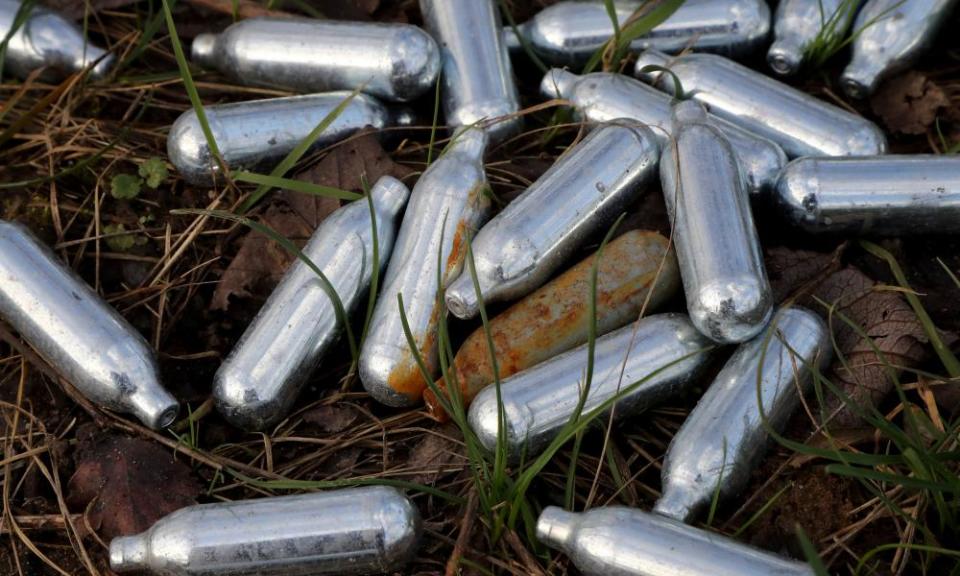UK ban on laughing gas sale or possession poised to go ahead

The Home Office is preparing to introduce a long-expected ban on the sale or possession of nitrous oxide, one of the most popular recreational drugs among young people, as part of a wider crackdown on antisocial behaviour.
The plan is being pushed by the home secretary, Suella Braverman, according to officials, and would lead to people found with laughing gas, which is usually inhaled from balloons filled through small metal cylinders, facing prosecution.
Discarded nitrous oxide cylinders are a ubiquitous sight on high streets and at festivals, with almost one in 10 16- to 24-year-olds reporting having taking the drug in 2019-20.
While supplying nitrous oxide for its psychoactive effects is already illegal under 2016 legislation, the gas has legitimate uses, primarily for the production of whipped cream or for freezing food, and it is widely available online.
The planned change to the law, first reported by the Times, would permit the gas to be possessed for legitimate reasons – it is also used as pain relief, for example in childbirth – but would ban recreational use and supply, most likely bracketing it under the same classification as cannabis.
In 2021, the then home secretary, Priti Patel, asked the independent Advisory Council on the Misuse of Drugs (ACMD) to review the harms of nitrous oxide with a view to a potential ban.
The gas produces sensations of euphoria, giggling and hallucinations, but can also cause dizziness and impaired memory, as well as accidents from leg weakness. It can also cause neurological problems by inactivating the vitamin B12.
Doctors have warned about an increase in spinal cord and nerve damage caused by the drug, including paralysis.
The Dutch government is to introduce a ban on laughing gas this year following concerns about the risks it poses to health and to road safety, after a surge in traffic accidents linked to the drug including a series of fatalities.
According to the Times, a UK ban would be tied to a wider crackdown on antisocial behaviour, given the numbers of discarded cylinders seen every weekend.
In a speech this month, Rishi Sunak cited the canisters as a visible sign of antisocial actions, which he called a “gateway to more extreme crimes”. He said: “They spray graffiti on war memorials, discard needles and nitrous oxide canisters in children’s playgrounds, gang together and cause disorder and disruption.”
When Patel ordered the review, the Royal Society for Public Health said criminalisation did not seem likely to reduce use of the drug, while the drugs charity Release said it could leave tens of thousands of young people with criminal records.
In 2015, the then chair of the ACMD, Prof Leslie Iversen, told the home secretary at the time, Theresa May, that possession of laughing gas should remain legal.
A Home Office spokesperson said: “Antisocial behaviour causes misery in communities and we are determined to crack down on this scourge to protect our streets. Nitrous oxide is one of the most commonly used drug among 16- to 24-year-olds in England and can have damaging side-effects.
“We have been clear we want to see common-sense policing to keep our communities safe. That is why we are actively considering a ban on the sale and use of this harmful drug and will ask the Advisory Council on the Misuse of Drugs to hasten their delivery of the report we commissioned, which we will carefully consider in reaching any decision.”

 Yahoo Finance
Yahoo Finance 